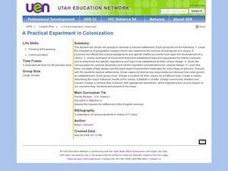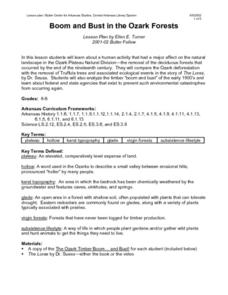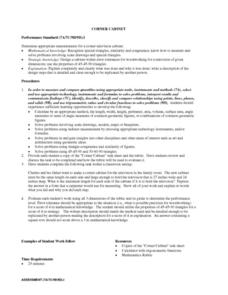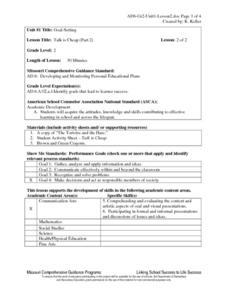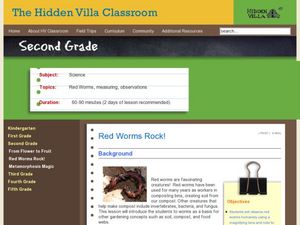Museum of Tolerance
Can It Happen in America?: Taking Social Action
Class members investigate the Jim Crow Laws, Executive Order 9066, the Chinese Exclusion Act, and the Indian Removal Act to gather information about not only the challenges encountered by diverse groups of Americans, but their...
Cornell University
Wasps and Ladybugs
Can a good bug ever become a bad bug? An elementary entomology resource explores what to do when too many ladybugs or too many bees are in your home and can become a problem.
Curated OER
Origins: a Simple Word Game (for Use in Human Relations Trainings)
Tenth graders acquire the knowledge, attitude, interpersonal skills to help them understand and respect self and others. They participate in "Origins" as either group participants or judges. For each round, they give the common usage and...
Curated OER
The School Holiday Calendar
Various Muslim holidays and their meanings are researched and your students will predict whether or not they should be recognized on the New York City school calendar. An extension could be to write a letter to the Mayor about...
Developing a Global Perspective for Educators
Imagine Being Me
The design of this two-day lesson eloquently exposes learners to the topic of social justice for people with disabilities. The plan is built off the reading of Are You Alone on Purpose? by Nancy Werlin. The activity introduces...
Museum of Tolerance
The Price of Personal Responsibility
A reading of Patrick Henry's "Speech in the Virginia Convention," Henry David Thoreau's "Civil Disobedience," and Rev. Martin Luther King, Jr.'s "Letter from Birmingham Jail" launch a discussion about the price one is willing to pay to...
Museum of Tolerance
Influence of Media
We are bombarded with media images expressly designed to influence viewers. Learning how to analyze the intended effects of these images is essential and the focus of an activity that asks viewers to use the provided questions to guide...
Museum of Tolerance
The Role of Citizens in a Participatory Democracy
Groups research participatory democracies and compare the role and rights of citizens in ancient history with those in recent U.S. history. Guided by a series of questions, individuals compose a persuasive essay in which they discuss the...
Museum of Tolerance
Improving My Community Through Social Action
Action is the heart of change. Encourage class members to not only identify critical social justice issues in their school or community but to take action as well. As individuals or as groups, they research a situation, develop a...
Curated OER
A Practical Experiment In Colonization
Role-play and simulation exercises are fantastic ways to help learners understand the reality behind many social and historical events. Pretending they are colonists, upper graders choose a location, create a history, establish laws, and...
Curated OER
Practical Experiment in Colonization
Students examine the effects that cultural background and specific historical events have upon the development of a colony. They research the colonies to design their own.
Curated OER
Dr. Seuss and Universal Themes
Discover some of the themes of Dr. Seuss's major books. They see that despite being written for young people, Dr. Seuss' books contain powerful messages and important themes.
Curated OER
Boom and Bust in the Ozark Forests
Here is a hard-hitting, cross-curricular lesson on the effects that the deforestation of the Ozark forests in the 19th century had on the people, animals, and ecosystems of the area. The Dr. Seuss book The Lorax is used as a way of...
Curated OER
A House Dividing: The Growing Crisis of Sectionalism in Antebellum America
Learners explore the debates over American slavery and the power of the American federal government for the first half of the 19th century and how the regional economies and political events produced a widening split between the states.
Curated OER
Desert Plant Adaptations in the Sonoran Desert
Students are able to identify adaptations that plants have developed to deal with harsh desert conditions, as well as explain how these adaptations help to protect these plants.
Curated OER
CORNER CABINET
Ninth and tenth graders calculate the length, width, height, perimeter, area, volume, surface area, angle measures or sums of angle measures of common geometric figures. They solve problems involving scale drawings, models, maps or...
Curated OER
Directed and Undirected Free-writing: An Activity in Brainstorming
Let your writers take a break from formal writing and experiment with undirected freewriting. First they'll discuss the difference between directed and undirected freewriting. Then they'll put their knowledge to work and create some...
Curated OER
Talk is Cheap: Part 2
Second graders examine and discuss different goals that lead to learner success. They discuss the story of "The Tortoise and the Hare," and discuss different goals and scenarios on a handout. Students then write a personal learning goal...
Curated OER
How Does a Friend Act?
Students brainstorm a list of characteristics that friends should and should not have. In groups, they are given a set of hand puppets in which they role-play different scenerios in front of the class. To end the lesson, they are shown...
Curated OER
The Ancient Art of Shadow Puppet Plays
Shadow puppetry has an ancient past, it is also a great way to build oral expression and reading fluency. Young thespians research folk tales, compare and contrast reality and fantasy, then create and perform a shadow puppet play based...
Curated OER
Proving the Purpose of Punctuation
Explore the importance of correct verbal and written communication in the real world. Middle schoolers brainstorm what their world would be like without punctuation, listen to and read excerpts without punctuation, and record and present...
Curated OER
Eloquent Words
Logan’s Lament, a speech delivered by Mingo Chief Logan in 1774, provides pupils with an opportunity to not only study the historical events surrounding the battle between Native Americans and the Europeans for the West Virginia...
Curated OER
Red Worms Rock!
Second graders measure red worms. In this instructional activity, 2nd graders observe and collect data on red worms. Students measure the red worms and create a graph with the data they collect.
Curated OER
Missing Macroinvertebrates - Stream Side Science
Field study groups collect samples of stream water and identify the macroinvertebrates found. Using their data, they calculate a water quality index to rate the health of the stream. They graph their data and discuss the value of a water...
Other popular searches
- Equality Tolerance
- Teaching Tolerance
- Religious Tolerance
- Acceptance Tolerance
- Cultural Tolerance
- Racial Tolerance
- Tolerance and Diversity
- Tolerance Quiz
- Tolerance Lesson
- Poetry About Tolerance
- Racial Tolerance Activities
- Culture Community Tolerance











